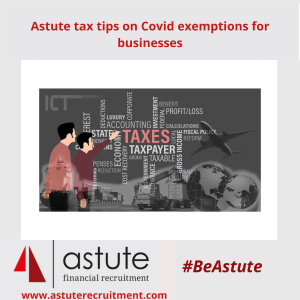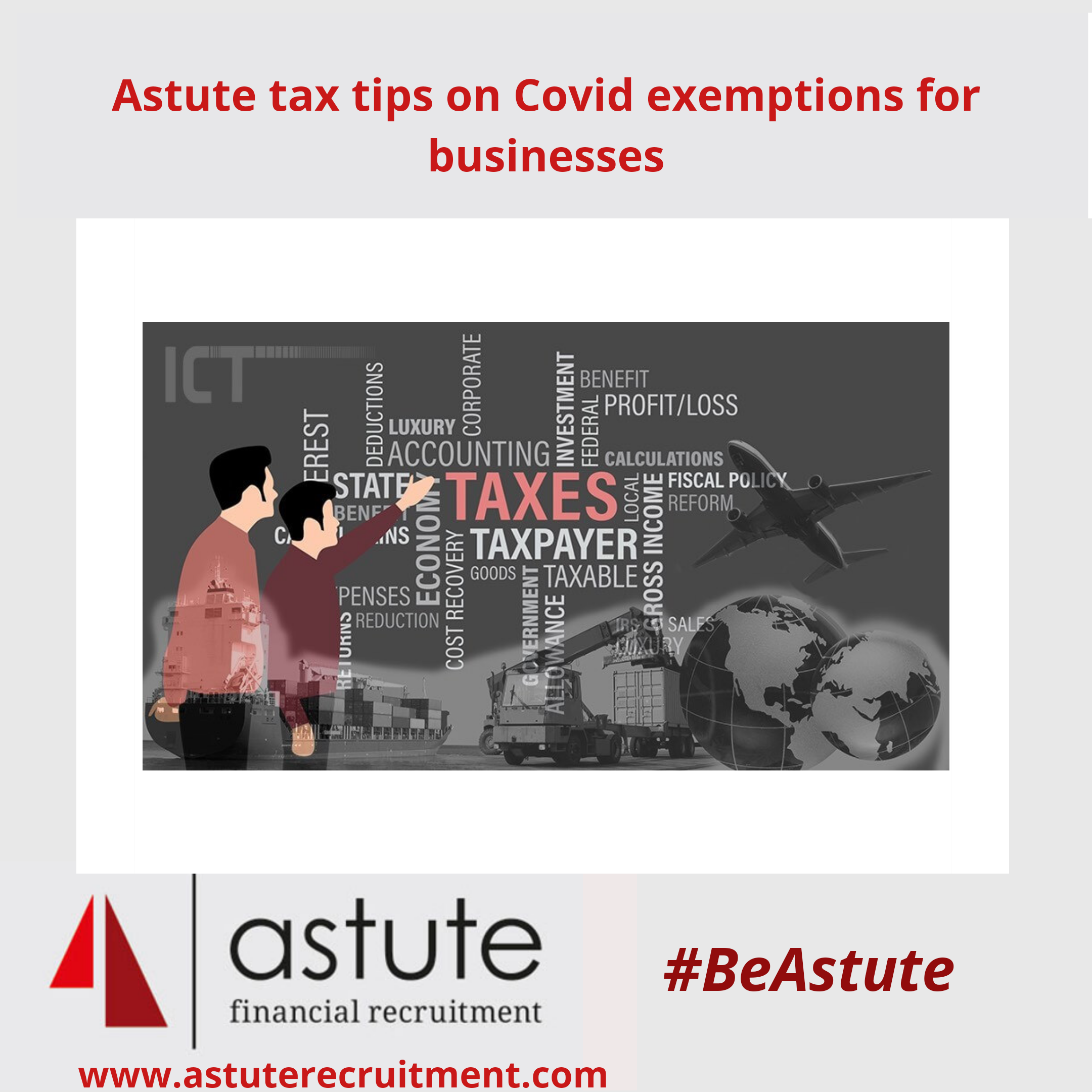
Employment-related coronavirus tax reliefs
Since March last year, many interim tax exemptions were brought in to prevent “benefit-in-kind” issues arising from coronavirus-related costs incurred by employers. Here at Astute Recruitment Ltd, we felt it was important to highlight these, especially for SME businesses and employers in general who may not have a resident tax expert on-hand.
Helen Thornley, technology officer at ATT, compiled a really useful article in Accountancy Age, highlighting some of the main points to help employers, employees, and flags the measures with a limited shelf-life. We have summed up the key points with useful links below.
COVID-19 tests provided by Employers
HMRC’s position on this has waivered. Originally HMRC advised that tests provided by employers outside the national testing programme were a taxable benefit in kind for the employee because said tests were not “wholly, exclusively and necessarily’ for the purpose of the employee’s duties.
Following widespread criticism, including the Treasury Committee saying this was an unhelpful stance, the Chancellor readily agreed to do a ‘180’ on this.
As expected – to transfer the alterations into formal legislation has taken time, so tax policy papers in November and December 2020 confirmed that there will be ‘no tax consequences for employer-provided testing for ‘active’ cases in the 2020/21 tax year. This specifically refers to antigen tests that identify current COVID-19 cases.
An important caveat is that this exemption DOES NOT extend to employer-providing antibody testing as antibody testing tests whether an employee has had the virus previously. Normal benefit-in-kind rules continue to apply to them.
Every policy paper has its own new statutory tool with its specific relevance to these changes.
- The first statutory instrument provides that ‘income tax’ is not chargeable on employer-provided tests for ‘active’ cases of coronavirus from December 8, 2020 to April 5, 2021. The accompanying policy paper confirms that HMRC will exercise their discretion under their collection and management powers and not collect either income tax or national insurance contributions (NICs) on tests carried out earlier in the 2020/ 21 tax year.
- The second related statutory instrument (due in January) exempts from NICs any employer who opts to either reimburse or provide funds in advance for an employee’s coronavirus test. This will apply from 25 January to April 5, 2021, but again the policy paper confirms that HMRC will use their statutory discretion to refrain from collecting both NICs and Income tax for employer-reimbursed tests for the earlier part of 2020/21. The corresponding income tax exemption is due to be included in the next Finance Bill.
IMPORTANT: Employers should be aware that, as HMRC’s view of the underlying position has not changed, unless further exemptions are granted, when these antigen-test exemptions expire on April 5, 2021, the costs will revert to being a taxable benefit in kind. Since employers could well still be paying for tests beyond that date, the ATT is raising concerns with HMRC and asking for these antigen-test measures to be extended.
Office equipment
At the start of the pandemic when mass homeworking was first advocated, many employees will have found themselves in need of extra equipment – from laptops to monitors, keyboards and printers and even office furniture. In general, provided there is no significant private use, employers can provide these items without tax consequences.
BUT, where employers allowed employees to purchase the required items themselves and then agreed to reimburse those costs at a later date, such reimbursement is taxable under the usual rules. Thankfully a temporary exemption from these rules will apply to reimbursements made between 16 March and April 5, 2021 inclusive. During this period of time, provided that the equipment was purchased for the sole purpose to enable homeworking/ WFH to take place as a result of coronavirus – and it would have been tax exempt if the employer had provided it directly – employers will be able to reimburse their employees for purchases of office equipment without tax or NIC consequences.
Being and ‘Cycle to work’
Under the ‘cycle to work scheme’ an employee can hire a bike, AND necessary safety equipment, from their employer and pay for that hire out of their pre-tax earnings. The scheme effectively allows employees to obtain a bike in a tax-efficient manner, provided that the employee uses the bike at least 50 percent of the time for qualifying journeys, which generally means commuting to and from work.
Employees who have benefited from these schemes but are now working from home may well struggle to meet this condition. HMRC guidance has now been updated to confirm that anyone who joined an employer-provided cycle scheme before 20 December 2020 will not have to meet the 50 percent qualifying journeys requirement. This easement will apply until April 5, 2022.
The easement will not apply to employees who joined a scheme on or after December 21, 2020 as they will have been expected to factor in the impact of the pandemic on their use of the bike.
‘Online parties and work socials’
On November 20, HMRC acknowledged that a virtual party would fall within the current exemptions for an annual function. This meant that employers wanting to provide some sort of festive fun wouldn’t land their employees with a tax bill provided that they followed the usual rules requiring the event being annual (i.e. not a one-off celebration), open to all staff and that the total cost of the event (including VAT, food, drink or party favours in a ‘party box’) was no more than £150/head.
While Christmas is past, the pandemic is still very much with us, so employers with other annual events coming up might be pleased to learn that the relaxation was not just in respect of Christmas parties, but any such annual function – provided that the total cost per head of the events combined is less than £150 in any given tax year. This means that provided all the other conditions are met, an employer can move comparable regular events online and still benefit from the usual rules for annual functions.
While all these exemptions are helpful, most of them are time-limited and employers who miss the relevant ‘windows’, could still create a benefit-in-kind charge for themselves and their employees.
This article by Mary Maguire, MD Astute Recruitment, was based on an original article by Helen Thornley, an ATT technical officer, which appeared in Accountancy Age on 7.1.2021. For the original article, click HERE.










